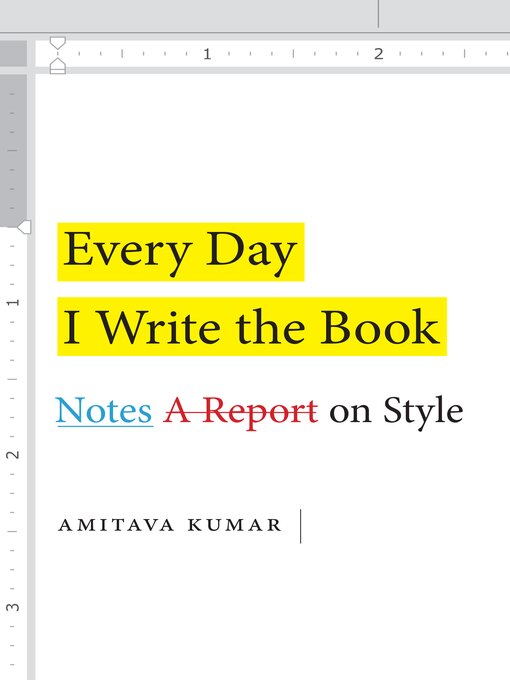-
Creators
-
Publisher
-
Release date
December 4, 2023 -
Formats
-
Kindle Book
-
OverDrive Read
- ISBN: 9781478007197
-
-
Languages
- English
-
Reviews
-
Publisher's Weekly
November 11, 2019
Vassar English professor and novelist Kumar (Immigrant, Montana) addresses fellow scholars—particularly those starting their careers—in an inventive essay collection that speaks both to his “attraction to academic writing and rebellion against it.” Presenting an argument, but not a how-to, for clearer and simpler scholarly writing, Kumar considers stylistic elements such as structure and voice, or practical problems such as getting published, without making one-size-fits-all proclamations. Celebrating those writers who “blurred the lines between the critical and the creative,” particularly Susan Sontag—a frequent reference point—he shares relevant excerpts from interviews he’s conducted with such writers as Viet Thanh Nguyen—whose “ideal writing criticism as fiction and fiction as criticism,” and Salman Rushdie, while also introducing less familiar writers as models to emulate, including Manthia Diawara (In Search of Africa) and Sarah Manguso (300 Arguments). The result is a celebration of “the value, the ease, and also the excitement of crafting writing that hasn’t been produced to please a committee.” Grad students and tenure seekers will appreciate the support Kumar’s insightful and intellectually nimble book offers, even as they buckle down to the task at hand—satisfying that committee of readers. -
Kirkus
December 1, 2019
A guide for academic writers that is also relevant to anyone who cares about fine prose. Novelist, essayist, and literary scholar Kumar (English/Vassar Univ.; Immigrant, Montana, 2018, etc.) offers a handbook on style and form that is simultaneously elegant and practical. Admiring "fresh, provocative, unpredictable texts," the author is dismayed by what Toni Morrison called "the proud but calcified language of the academy." As fiction writer David Means observed, "so much academic writing seems sealed up and hermetic and uninspired, shorn away from a love of subject." Academic writers, Kumar asserts, work in a "culture of oppression," in which they strive to fit into "the existing codes"--scholarly jargon--of their field in order to publish the articles and books that will earn them tenure. As a graduate student, he admits that he, too, tried mightily to emulate his teachers "and wrote sentences whose texture was inevitably thicker than cement." Dissatisfied with the quality of his work, he despaired of ever attracting readers: "Couldn't our analyses become more exuberant, imaginative, and even playful?" Kumar agrees with other writing guides--Strunk and White's for one--that advocate clarity and conciseness, but he knows that the admonition to "find your voice" can be confusing. "Perhaps specificity is what brings us closer to the idea of voice, which I think is another word for distinctiveness." Voice, in any case, "depends on the question you are asking" and the "zones of experience" from which a writer is drawing. Kumar appends his slim manual with 10 habits he recommends to his students, including setting a daily goal of at least 150 words, turning off the internet, making sure to exercise, keeping a bookshelf of several volumes to turn to as guides in "the critical matter of method or style," and finishing one project before taking up another. He shares advice about craft from many writers of fiction, nonfiction, and poetry, all of whom strive to "bring delight." In that aim, Kumar amply succeeds. An engaging, perceptive companion for all writers.COPYRIGHT(2019) Kirkus Reviews, ALL RIGHTS RESERVED.
-
subjects
Languages
- English
Loading
Why is availability limited?
×Availability can change throughout the month based on the library's budget. You can still place a hold on the title, and your hold will be automatically filled as soon as the title is available again.
The Kindle Book format for this title is not supported on:
×- - Kindle 1
- - Kindle 2
- - Kindle DX
- - Kindle Keyboard
- - Kindle 4
- - Kindle Touch
- - Kindle 5
- - Kindle Paperwhite
- - Kindle 7
- - Kindle Voyage
Read-along ebook
×The OverDrive Read format of this ebook has professional narration that plays while you read in your browser. Learn more here.


